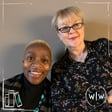Become a Creator today!Start creating today - Share your story with the world!
Start for free
00:00:00
00:00:01

#191 - Louie Stowell
Children's author and illustrator, Louie Stowell joins us this week to chat about the success of the Loki series, accidentally becoming her own illustrator and the challenges of finding a readership with middle grade books. (Photo by Robin Christian ©)
https://lokibooks.com/books/making-enemies
💖 Join the Patreon 🙏
Support the show and get access to the extended cuts early and ad-free!
📚 The Chosen Ones and Other Tropes 🥳
Jamie, Melissa and Noami talk about all things writing, tropes and publishing!
✍️ WriteMentor 🧑🏫
Get a whole month with WriteMentor's Hub for free using the coupon code 'Write&Wrong'.
🎙️ Zencastr 🎬
Click on this referral link to get 30% off your first three months with Zencastr.
Transcript
Introduction and Guest Overview
00:00:00
Speaker
Ooh, a spicy question. I love it. Because the writing is sort of everything, right? Like, you could have fixed plot holes, but if the writing... So some readers love that, and some readers are like, but I wanted more of this. So it's kind of a gamble. Hello, and welcome back to the Right and Wrong podcast. On today's episode, I am joined by a middle grade author who writes and illustrates her novels. It's the hilarious, multi-talented Louis Stowell. Hello. Hello. Hello. I'm very excited to be on.
00:00:30
Speaker
Thanks so much for coming.
Loki Series and Norse Mythology Exploration
00:00:31
Speaker
um Jumping right in, you have found incredible success with ah the Loki series and Loki, ah bad A Bad God's Guide to Making Enemies, the latest one. Book number four is out September 12th. So as of this airing, tell us a little bit about that book and ah the rest of the series. so I will. Yeah. Love to talk about it. It's funny, actually, because i I do a lot of talking to children normally. um And so actually talking to adults about books is a fairly new thing for me. and Okay. So I'm normally saying, well, this is what Norse mythology is, but I feel like I can probably assume that as knowledge. So yes, so it's a series of books, taking the Norse myths and plonking them in the present day. And i've I've always loved that in fantasy, where you get kind of folklore or legend or myth, and it's sort of
00:01:22
Speaker
made to abut with yeah cars and gaming and the internet. So Loki has been sent down to Earth as a punishment for his many wicked deeds. um And the main punishment is going to school and being being forced to be 11, which when you're thousands of years old and you've never had a bedtime before is deeply insulting.
00:01:41
Speaker
Um, so, uh, so I sort of tried to write them as though you can read everyone as a standalone, but there, there is a continuity. So book four is he's been there for about four months now. So each book takes place over ah roughly a calendar month. Um, so he's sort of bedding into his life and it has been, he's, he's, the reason he's on earth is he's, he's supposed to learn to be a better person. Um, so he's sort of gradually learning that, but, um, but because I suppose the,
00:02:10
Speaker
kind of conceit is he's a bad God. I can't have him get good too quickly. So in book three, I made sure he back slid a bit. um Okay, so book four, he's kind of, he's got a bit of, he's got a lot to make up for, I think. um And he encounters an enemy from his past.
Character Development and Myth Adaptation
00:02:26
Speaker
Only Loki makes enemies so easy, he doesn't actually remember them all. So this one is sort of new to him. Someone who's insulted, um who kind of considers themselves Loki's nemesis. But Loki is like, Who are you again?
00:02:38
Speaker
um And yeah, so it's an elf this time, um which I was very excited to write because I'm a big fan of Hulking. And elves in Norse mythology aren't one of the more sort of well-known areas. um And there's not actually that many attestations of elves in in Norse mythology. um There's only one named elf that I've ever been able to find, um and he's called Volund. He also appears in kind of English stories as Wayland the Smith.
00:03:07
Speaker
And he's an elf prince and he makes jewelry and amazing gadgets. So he's kind of, um, Oh, what's this face that helped the guy get out of the labyrinth? My Greek mythology is not as good as my Norse mythology. Daedalus. Oh, okay. Yes. So that kind of, yes. So Daedalus, yes. So it's a bit like that where he, you know, he's a gadget guy. He makes kind of magic flying devices and things. And, but he's also- Oh, because Icarus, right? Yeah, it's kind of like that, but, but Volund as well is also the tech guy.
00:03:42
Speaker
um Okay, right. So sort of um he has quite a sad story really. He um he meet you meets a lovely wife, um but she leaves him. um She doesn't just leave him, she turns into a swan and then leaves him.
00:03:58
Speaker
Um, so he's already on the back foot, but I obviously had Elon Musk in my head at this point, because I was like very divorced tech guy. Um, but, um, and then, so, so he then gets captured by a King who wants to make him work. So again, a bit like Daedalus, he's, you know, he's forced to work only this story is quite brutal. They, um, they sort of, sorry, anyone screamish, but they cut through his, um, hamstring so he can't escape. Um,
00:04:27
Speaker
Lord Smith likes to go into those very bloody details without warning. So yeah, so he's trapped and um this king forces him to make him gadgets and jewelry and fancy stuff. um And this elf is not taking it lying down, so he then massacres the king's sons and goodness turns them into jewelry. So he makes, you know, like jeweled skulls and necklaces out of their various body parts.
00:04:53
Speaker
um Obviously, I'm writing children's books. So I haven't put this guy as a main character. I've made his son be the main character. I mean, okay, well the main nemesis for Loki. Because I think characters who have, you know, sort of very iconic parents, it's quite interesting. What must that be like? You know, you've got a famous dad, but no one knows who you are. And also a famous dad who's quite unpleasant. um And I thought,
00:05:20
Speaker
he'd be quite an interesting kind of foil for Loki. loki's doesn't well In my version of the story, he doesn't know who his parents are. We do in the myths and it will come out eventually in in the books, but for the moment, Loki is unparented. So the idea that someone's kind of someone with very powerful daddy issues and someone who kind of thinks of himself as springing from nowhere, um I thought they'd be a good good pairing.
00:05:43
Speaker
Yeah, no, I think that's true.
Norse Mythology vs. Popular Culture
00:05:46
Speaker
It's interesting to to speak about the like, you really really like the idea of taking those kind of old stories or Norse stories, ah where myth mythological stories and putting them in the the modern world. What do you think of the the Marvel interpretation of the Norse gods? It's not as good as the Ragnarok show on Netflix, which is amazing, which is kind of Norse myths in high school. And ah the giants are represented by like a big um industrialist family who is polluting the local, what do they call them, not lakes, like the big fjord. And so it's all kind of done in a very small town way, which I think is quite interesting because
00:06:25
Speaker
Obviously, like most Vikings would have had quite small town lives, you know, you don't have that kind of, I mean, some of them went to big cities, but quite often, you know, you would have lived in relatively small communities. So that feels like a kind of weirdly period appropriate approach. Yeah. um I mean, Marvel is just its own thing. It's very much, I mean, they're not really, they're not really gods, they're aliens, you know, they're from a different planet.
00:06:46
Speaker
um And it just means that every time I have to explain Norse mythology to children, I have to kind of deprogram them from the Marvel version. Yeah. um Which I think is kind of, has very much accepted the Christian version of Loki as its word, and he's just kind of evil. um He's not really a trickster in Marvel, or at least not in the films, like he is a bit more in the comics. So he's a bit more kind of wahaha, I'm going to take over the world. Whereas in the myths, Loki is more like he's a bit more of a kind of he's much more ambivalent. He's he's a helper character. ah He helps the gods get out of trouble. But often it's they're in trouble because of him. So it's, he's not that helpful. um But he's definitely like, oops, I took it too far. and now Exactly. And I feel like I actually think that's something kids can relate to. Because I feel like there's oftentimes when you you realize you've taken it too far as a child, and you just you didn't quite sort of think through the implications of what you were doing. So yeah, I think that kind of
00:07:43
Speaker
it sort of hits a particular part of childhood shame and guilt. Yeah, absolutely. And obviously, while saying you need to deprogram people from the Marvel kind of approach to to the Norse gods, you're obviously not going to go, like you said, it's for children, you're not going to go for the full like dismemberment, insane kind of thing that that the original myths actually talk about.
00:08:08
Speaker
I mean, am I? I definitely refer to it. So the only time my editors told me no too far was when I was doing a World Book Day book. So, you know, they give out free books to kids on, it's in March and, you know, everyone gets a free book. And there was a Loki one of those this year. um And I did three short stories. And one of the short stories was a retelling of a myth. um And the myth ends with Thor kind of battering some giants to death with his hammer.
00:08:36
Speaker
Um, and I originally described this as it is described in the myth and my editor was like, maybe that should happen off screen. So, uh, so yes, he kind of, I think Loki kind of alludes to it as like a violent, hammery death, but you don't actually see for doing it. Um, so yeah, so I think it's kind of alluding to the violence and the fact that for instance, the creation myth is, um, is one of violence. It's Odin. This member's a giant.
00:09:06
Speaker
and and uses his body parts to make the world. yeah um So i do I do kind of mention that, but again, I wouldn't go into a graphic description of it. Oh, okay. So you do try and keep it kind of loosely accurate.
00:09:19
Speaker
Yeah, yeah, because I think of it in terms of like the fairy tales I read as a kid, I very much had the pre Disney ones. yeah I think the only one I had edited for me was um Sleeping Beauty because that one is actually too dark. um but the ah But I had the version of Cinderella where the the ugly sisters cut off their feet and that sort of thing.
00:09:40
Speaker
And had their had their eyes pecked out as well. yeah um So I don't really believe in toning things down too much um because I ah don't know how many children you know, but they're very bloodthirsty. And whenever I do kind of writing workshops, it's always it's always kind of full on death.
00:10:00
Speaker
Um, so while I wouldn't, I don't want to traumatize any child and and I always, yeah know everything everything's in a kind of comic context. So it's funny. It's, it's kind of com Tom and Jerry violence, not, you know, serious violence. Um, I think kind of, what do you think about what else they're doing with their time? They're playing computer games and much more violent than the books they're reading.
00:10:19
Speaker
And I often think, well, if you're going to compete with computer games, you kind of got to give them something, you know. Oh, absolutely. Yeah. Yeah. so So the other is that you're not going to completely, the the sort of designification of all of those grim fairy tales where they are so loosely the story that the original fairy tale writes. you're you're You're trying to keep it more like, no, you could, if you know what the story is, you know what the kind of stuff is happening that you've left out.
00:10:46
Speaker
Yes, exactly. So there'll be some in one of the writing a book at the moment, and um ah it's gonna have the goddess Freya in it. And it's sort of, there's a story of how she gets her necklace and she, let's say, spends her time with some dwarves in order to get the necklace. um I'm not going to retell that story.
Louis' Writing Journey and Challenges
00:11:03
Speaker
However, I will allude to it for the parents who know the story.
00:11:06
Speaker
Okay. Right. So, so basically, I mean, this is tough tapping on, I was going to go into, this is about your kind of, you have ah a history of writing in nonfiction and like well, this stuff. So this is tapping into that part of you where it's like, I imagine if you read something and you're like, okay, well, this doesn't make sense with the original telling, but the way you're writing it is like, if you do know what the actual story is, you can say, this makes sense. She's just not covering it.
00:11:34
Speaker
Yeah, exactly. I mean, I have had obviously, the internet being the internet, I've had reply guys message me always on Facebook, I don't know why, um sort of complaining about the accuracy of the myths. And, and what they're not what they don't really understand is that you can change things within a myth to suit your story. um So they're complaining about the fact that I don't seem to know who Loki's parents are. It's like, i i I know the myths. I'm just writing a story where you don't give all the information right away. yeah um And, and there's some things where basically, I there's some things where there's, there's a couple of potential and interpretations, because there's no such thing as the real myth, you have, we don't have anything written down from the time when they believed in the gods, we only have the Christian interpretation. So, um and some of that, you know, you can, you can believe it is what they actually thought, because
00:12:27
Speaker
of things like the poetic forms are quite hard to rewrite. So if the Christians were writing it down, they probably wrote down the oral version probably. However, that kind of idea of authenticity just isn't there because we don't have, there's no odyssey, you know what I mean? And even the odyssey isn't authoritative because again, these stories come from all oral versions and who's to say which one should have primacy. So I'm always quite wary of implying that there's a kind of true version of the myths. You know how in French there's the Académie Française that tells you which versions of French are supposed to be correct? um There's no version of that for myth, or indeed for the English language. It's very much a kind of like, it's a patchwork, it's kind of how how we've interpreted things. and I've used it few sort of a group of core texts for myself. um I tried to stick to stuff that was kind of roughly the same period, and I haven't used much later folklore.
00:13:25
Speaker
um And just just for a sort of personal sense of interior internal consistency. And so for instance, with elves, there is much later folklore and indeed, like, you know, folk belief, potentially now. um And I haven't really gone with that version. I've gone more with the version where you get it, that the story of Roland and the kind of sense of magic and violence.
00:13:50
Speaker
Yeah, yeah. um but Rather than little people living in hills. Yeah, yeah, I know what you mean. you Because you're writing for children, like you say, you're competing with a lot of other mediums, you need to grab attention and and not, you can't afford to have the JRR Tolkien thing of like a whole chapter to describe a hilltop, you know? Yeah, I mean, yeah, it's funny, because obviously I love Tolkien as a kid, and i I loved all the descriptions of, I mean, this made me a life you lifelong lover of walking.
00:14:19
Speaker
but but yes there is, I don't know if there's a very good comedy video summarising the idea of how Tolkien pitched The Lord of the Rings, I highly recommend looking it up and it's basically, it's just about how the entire thing is about walking.
00:14:33
Speaker
Yeah. um I can see that. Yeah. um I'd love to, I'd love to get but back onto you. um Sure. You've been writing a long time for this kind of age group, this um middle grade. I'd love to rewind and hear about where you first started. Like, where did you first get your foot in the door of publishing? And was it a long road to get there?
00:14:58
Speaker
It was an incredibly long road, such that I feel like people don't always believe me, but it really was. Because obviously see like we've got access to a lot of writers talking about their journeys now, which is great. It's really, really great.
00:15:11
Speaker
and But often ah I'll have people saying, oh, it took me so long to get published. It took me five years. It took me 10 years. um And that's bush league, frankly. you know um So I completed my first novel right after university, so I was 21. And I didn't get my first novel published and until I was 40. So it was definitely a really long road.
00:15:34
Speaker
Um, and some of that long road was just me enjoying my twenties and not being very proactive. Um, and I think I, I sort of didn't do much of, I didn't do much of putting myself out there because I didn't know that was a thing you could do. I suppose it was sort of pre-social media early 2000s. Um, and so I, I kind of, I submitted various books and then there was one, I think it took about eight years to get close and then But it's still no. um and And I had several agents over that time that I kind of parted ways with for various reasons. um And so it wasn't until I got my second agent that I got a book deal. um And I think basically a lot of the stuff I was writing, I think I sometimes just missed the boat. So for instance, I wrote a book about vampires, but it was too soon after Twilight.
00:16:28
Speaker
um and I wrote and then I also didn't understand the kind of the fact that um there is not just age groups for kids but there are genres so I think I one of the first books I wrote was a YA but it wasn't y a YA in genre terms it was just happened to be about teenagers okay but I didn't understand that YA had to be about emotions and romance and stuff so it was just like a straight out zombie comedy um about being on work experience. It was like not none of the stuff that YA readers actually want. um but So that was actually my first successful submission. um I went on submission with this YA. Everyone said no to it, but an editor said, i don't I'm not going to publish this, but what else have you got? um So I guess my first kind of success was also a failure because it was ah that book didn't get published.
00:17:20
Speaker
um But basically i I kind of came up with a list of other books that I had either written versions of or just had come up with on the spot. So I think I picked, this was um Tom Bonnick who was then a nosy crow. um I pitched him about five ideas, one of which was actually Loki. um And he took on two of them. So one of which was a series that became The Dragon in the Library. um And one of which was, um again, it was originally a series but ended up being ah a single book called Otherland.
00:17:52
Speaker
um which was sort of very loose cousins of the very first novel I ever wrote, but but basically had nothing in common except the villain. Actually, no, it didn't even have the villain in common. It had one minor character in common, but it was sort of phenomenally the same world.
00:18:06
Speaker
um So yes, it was a very kind of complicated journey for me. There was no kind of one moment where I'd made it. And um my first book came out in 2019, that was The Dragon in the Library. um It was kind of younger middle grade, that one's seven to nine, heavily illustrated by a guy called David or two.
00:18:23
Speaker
Um, which was a lovely collaboration actually, because when you're a, you know, pros, middle grade writer, you don't really meet your illustrator or anything, but we found each other on Instagram and started sending messages, um, which I'm sure the designer loved. Um, but, but he added really interesting details. I wouldn't have thought ah of but in terms of character design. So, um,
00:18:43
Speaker
So that was, that was
Pandemic Impact and Publishing Advice
00:18:44
Speaker
quite exciting actually. And then, um, so then the pandemic happened and basically, so my first book, you know, it sold, I think it sold like 10,000 copies or something. It was fine. Like it was good. Um, but then the pandemic happened and my next like three books just sunk without trace. Um, so during the pandemic, I was working at Penguin at the time. So I've had, I've had kind of publishing jobs along the side of all of this. So I started working.
00:19:09
Speaker
I did advertising first, but then I did um publishing from about 2005. I worked in house, in house Osborne, where it nonfiction. So it's kind of, I always recommend as a publishing job, if you're someone that actually wants to write, because they basically pay you to sit there researching and writing nonfiction. um It's sort of almost like being in academia rather than publishing, because you don't really do any of the business side, you just do the sit there writing the books. So that was kind of sort of nerdily fascinating. I did a lot of books on space. It was all for children as well, isn't it? All for children, yeah, yeah. um And then I got more of a traditional publishing job. um I got head-hunted by pe Penguin and went to the editorial director at Ladybird. And that was like a kind of fascinating introduction to the hardcore business side of publishing. um And while I was at Penguin was when I wrote wrote Loki.
00:20:05
Speaker
um the one and it was basically a version of the thing I pitched originally to nosy crow but I kind of came up with a new twist because the original version he was a child version of Loki who then goes down to earth as a child and then the version I then came up with was no he's an adult god who becomes a child and I sort of just realized that was immediate because you know like adults having to be children sort of reverse big um or Fruity Friday, I suppose, but no, no, you know, no opposite number. um And yeah, so that was, that was, that was my kind of pandemic book. And I think it was, you know, trying to write something funny when everyone was very miserable and just cheering myself up really.
Illustration and Creative Process
00:20:49
Speaker
um So, ah so I had a very different experience of submission with that one. It was, I don't know if it's exactly, and I never really understand the distinction between auctions and pre-emps and stuff. There was basically various people interested. It was all very quick.
00:21:03
Speaker
um and um the reason I went with the publisher I did Walker and my editor Non um was other people like had really good ideas for it but Non was like uh so it's going to be illustrated right why don't you do the pictures and I've never illustrated anything before you know except the odd kind of comic or cartoon um so that was that was kind of the vision Well, I guess I appreciated their faith in me, but also I think being able to draw it myself meant that I could shape the world in ah in a more total way than I could if another illustrator was doing it. Oh, okay. Yeah, I see what you mean. As in like it's entirely one focused vision as opposed to like a shared. Yeah. um um and it me and and i And I do like a shared vision, but I think realistically in publishing, you don't get to work as collaboratively with your artist as you might like anyway.
00:21:52
Speaker
So obviously I can collaborate easily with myself. And it also meant that I could adjust the text to fit the art and the art to fit the text. So if something, if a joke wasn't landing in text, I could turn it into art and vice versa. Oh yeah. I see what you mean. Cause obviously then it just gives you a lot more tools in terms of the comedic ah elements. Yeah. And also in in in terms of integrating the the image and the text, um, kind of playing with reading order, playing with, um,
00:22:20
Speaker
text and subtext. So, you know, something might appear in the pictures that doesn't appear in the text, which gives you a different insight into the characters. Like often, you know, Loki is not very emotionally honest with himself, but sometimes that honesty comes out in the pictures. Okay, that's really interesting. um So he'll be like, I'm fine, I'm fine, I'm fine. And then this picture, looks sad and but no hopefully funny. Yeah. yeah um Awesome. i'm We're going to get back onto this because I had some more questions about this, but it's that time in the podcast where we head over to the desert island. So I will ask you, Louis, if you were stranded on a desert island with a single book, which book do you hope that it would be?
Thoughts on Adaptations of LOTR and The Hobbit
00:22:58
Speaker
i This is actually quite an easy answer for me, it'd be Lord of the Rings. It's my favourite book as a child. um I had um read it really quite young, so I saw the Ralph Bakshi film when I was about three. Was that the animated one? Yeah, the animated one from the 70s. I saw it in the cinema, so there must have been on sort of re-release, um absolutely terrified by the Black writers. And then I was sick and my dad told me the entire story to Lord of the Rings.
00:23:25
Speaker
And then I read it when I was about eight, I think. um But I also listened to the dramatized version, which I think is better than the book. um It was a BBC production from the eighties and it had Ian Holmas Frodo and Bill Nighy as Sam.
00:23:41
Speaker
wow um I didn't work out for years that it was Bill Nye because they called him William Nye in that and it sort of penny dropped years later. um So yeah, so I've always, so I've basically been rereading Lord of the Rings every year all my life. have a board of it So I feel like I think that would be a solid desert island choice. Okay. I have to ask then, what do you think of the original trilogy movies?
00:24:05
Speaker
um Unfortunately, they hit exactly the wrong time for me because i i'd sort of they hit when I was at university and I'd just gone out of my peak Tolkien obsession, but I was still obsessed enough to be really critical. right And what I didn't like was the music. I felt like the music was culturally wrong. It felt a bit too Celtic and Tolkien isn't drawing on Celtic mythology. He's drawing on Norse mythology. um He's trying to create a much more kind of I guess for want of it were English mythology. um So the Celtic thing made it feel like it was trying to be a different mythology than it was. And I realized that's an incredibly anal complaint, but it really bugged me when I was like 19.
00:24:44
Speaker
the The music ones won multiple Oscars, I believe. Yeah, I know. um but also and But also, I think I was really like, I didn't want anything left out and they left out Tom Bombadil. And I was... Yeah, that's the biggest complaint between fans of the book as they left out Tom Bombadil. Because apparently it was filmed as well. they come yeah I didn't even know that, yeah. I had a room, at least it was in there at one point.
00:25:06
Speaker
i um There's an enjoyable fan conspiracy about him actually being the true villain of the book, and they kind of put together all these pieces that he was actually kind of behind Morgoth and behind Sarah. So maybe Rings of Power will do that, you never know. um Well, I'm almost scared to ask. like I'm assuming you didn't like The Hobbit. I never actually watched it because everyone said it was so awful. um I very much enjoy all the gifts of the elves and Fanjul and stuff, so I feel like I feel like just enjoying the gifts is fine and I never need to see it. Yeah. Yeah. I watched Rings of Power season one. I am waiting for someone to tell me if season two is good or not before I watch it. I know I'll get around to it. Basically season one, I just think I don't really like what they've done with Galadriel's storyline. I get what they were trying to do, but I just don't think it worked. I feel like if you're going to do kind of young, angry Galadriel, you still got to have that like,
00:26:07
Speaker
wildness in there. And I don't think she was wild enough because there's there's my favorite bit in Lord of the Rings is when the lateral kind of talks about what it would be like if she took the ring. Yeah. Um, and she's, you know, I'd be beautiful and terrible as the morning and night, all she'll love me and despair. And I was like, I need that in, I need that in rings of power, glad, you know, like, I feel like I want to know that her wild juice was properly wild and not just looking a bit constipated.
00:26:32
Speaker
Yeah, you want her to be like, yeah, you want to see both sides of the coin, right? You want to see her being amazing and achieving loads of great things, but also being chaotic and like messing things up. And they, they obviously tried to do that, but it just didn't feel correct the way they did. Yeah. It just, she just felt like a bit of a kind of like young fool. yeah And, and I just think.
00:26:54
Speaker
I wanted more of a like, like, where's my with nail and I collateral. You know what I mean? Where's my like messy, messy collateral. Yeah. But, but that you can root for her even though she's a mess. Yeah. Yeah. Cause she, I mean, maybe it should be more I than with now, but no, actually no, I want her to be with now.
00:27:09
Speaker
since um Amazing.
Creative Process and Closing Remarks
00:27:13
Speaker
So I have some questions coming up about, um we're going to good do more about being an author and an illustrator and how that affects the process and stuff like that, as well as um breaking into the middle grade market, which is a wildly competitive market, but that's all going to be in the extended episode available through the Patreon. Excellent. Yes.
00:27:33
Speaker
um I haven't actually told my agent about that one yet though. Cool that you're you're looking to kind of flex different muscles and do stuff like that. Well, thank you so much, Louis. That brings us to the end of the episode. It's been so cool chatting with you and hearing about everything that you've been up to and your kind of experiences with writing and ah publishing and and all that cool stuff. It's been it's been great. Yeah, very great to chat to you too.
00:27:56
Speaker
And for anyone wanting to keep up with what Louis is doing, you can follow her on all socials at Louis Stowell, or the one social that she's not that is on TikTok at WannaWatchThings. Or you can have it head over to the website www.louisstowell.com.
00:28:11
Speaker
Loki, a bad god's guide to making enemies, is out September 12th, and you can get that in all the usual places. To support this podcast, like, follow, and subscribe. Join the Patreon for bonus content, and subscribe for the ad-free extended episodes. And check out my other podcast, The Chosen Ones, another show, if you've got time. Thanks again, Loewe, and thanks to my amazing Patreons and everyone listening. We'll catch you on the next episode.



















